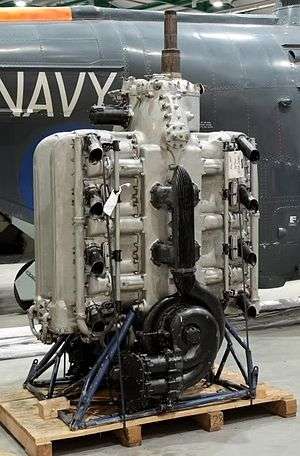Fairey Monarch
The Fairey P.24 Monarch or Prince 4 was a British experimental 2,000 hp (1,490 kW) class H-24 aircraft engine designed and built by Fairey in the late 1930s. The engine did not go into production.[1]
| P.24 Monarch | |
|---|---|
 | |
| Fairey P.24 at the Fleet Air Arm Museum | |
| Type | Piston H24 aero-engine |
| Manufacturer | Fairey Aviation Company Limited |
| First run | 1939 |
| Major applications | none |
| Developed from | Fairey Prince (H-16) |
Design and development
The P.24 Monarch was an enlarged development of the Prince, designed by chief engine designer Captain A.G. Forsyth.[2] Similar in layout to the Napier Dagger, the cylinders were arranged vertically in two blocks, driving contra-rotating propellers via separate shafts and gears. Like the smaller Prince engine, each bank of cylinders could be stopped in flight to drive only one propeller, an idea that was reused much later in the Armstrong Siddeley Double Mamba turboprop.
The idea came from the desire to deliver high power in a reliable form for naval use. A twin engined aircraft could not be designed such that even when "folded" it came within the limits for aircraft carrier use; with two power blocks the failure of an accessory would not lead to failure of the engine as a whole.[3]
The engine was test flown in a Fairey Battle, serial K9370, with its first flight taking place on 30 June 1939.[4]
The engine was considered for use in the Hawker Tornado and K9370 was later shipped to Wright Field in the US, where testing (Project MX-229)[5] was carried out in 1942 with a view to using the potentially 3,000 hp of the P.24 in the Republic P-47 Thunderbolt, a total of around 250 hours of test flying in the Battle being completed at Wright Field before the idea was abandoned. Following cancellation, the engine provided three trouble-free years of service in K9370.[6]
Variants
- P.24 Monarch or Prince 4
2,240 hp (1,670 kW)
Specifications (P.24 Monarch)
Data from Lumsden.[7]
General characteristics
- Type: Liquid-cooled H24 engine
- Bore: 5.25 in (133.35 mm)
- Stroke: 6.0 in (152.4 mm)
- Displacement: 3,117 in³ (51.08 L)
- Length: 86.25 in (2191 mm)
- Width: 43 in (1092 mm)
- Height: 52.5 in (1333.5 mm)
- Dry weight: 2,180 lb
Components
- Valvetrain: 2 intake, 1 exhaust valve per cylinder
- Supercharger: Four-speed, two stage
- Cooling system: Liquid-cooled
- Reduction gear: Spur gear, 0.543:1
Performance
- Power output: 2,240 hp (1,670 kW) at 3,000 rpm at 9,000 ft
References
Notes
- Gunston 1989, p.56.
- Capt. Forsyth Retires
- "Armstrong siddeley | fairey aviation | fairey battle | 1951 | 0643 | Flight Archive".
- Lumsden 2003, p.149.
- "MX-1 to MX-499 Listing".
- "World Encyclopedia of Aero Engines - 5th edition" by Bill Gunston, Sutton Publishing, 2006, P.71
- Lumsden 2003, p.150.
Bibliography
- Gunston, Bill. World Encyclopedia of Aero Engines. Cambridge, England. Patrick Stephens Limited, 1989. ISBN 1-85260-163-9
- Lumsden, Alec. British Piston Engines and their Aircraft. Marlborough, Wiltshire: Airlife Publishing, 2003. ISBN 1-85310-294-6.